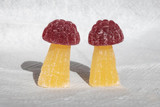CBD and Hemp: Yes, There are Some Differences!
It’s far from unusual to see products labeled as “hemp” and “CBD” contain identical ingredients, and thus, promise to do the same thing. Few people actually realize that technically, these words mean two different things. CBD is associated with hemp, and vice versa, but failing to know the intricate differences between the two can stop you from getting the specific relief that you’re looking for.
So, we’ll be explaining what these two terms mean, and why they’re commonly used interchangeably. You might even be surprised by just how much companies can mislead you with these specific terms, which is why our goal is to educate you to spot the differences easily.
Hemp and CBD: Two Terms That Don’t Mean the Same Thing!
Hemp and CBD technically describe two things that’re closely related. You will likely come across a lot of products called “hemp oil” that seem identical to “CBD oil”. But, these terms are often superficial, being used to promote a product. What matters is the ingredients inside, and how the products are made.
Allow us to explain further by defining each term individually.
What is Hemp?
Hemp is a plant species that belongs to the cannabis genus, to which marijuana also belongs. Marijuana is a known psychoactive due to its high THC content – about 15 to 25 percent in any given strain – which gets users high. In the hemp plant, however, there’s only a trace amount of THC – about 0.3 percent.
The hemp plant’s stalks are commonly used for producing various types of fibrous materials. The female hemp plant’s flowering buds, however, are where you’ll find CBD. Not only that, but you’ll also discover hundreds of unique compounds that have a fascinating synergistic relationship to one another. Within these flowering buds are ample amounts of cannabinoids, terpenes, flavonoids and nutrients.
What is CBD?
Cannabidiol (CBD) is the dominant chemical compound that’s present in the flowering buds of the female hemp plant. It’s a cannabinoid, which means that it binds to cannabinoid receptors throughout various systems of the body to produce regulatory effects. This is why CBD is such a hot item on the wellness market right now. These regulatory actions may improve overall wellbeing through a uniquely wide variety of biological mechanisms that relate to homeostasis.
Cannabidiol is only one of hundreds of cannabinoids that can exist in hemp, but because there’s more CBD than any other compound, it’s the one that gets the most attention. It’s also the most widely studied hemp compound, and for that reason we know the most about it compared to the others.
Different Types of “CBD” Products Derived from Hemp
Now you can understand the difference between “hemp” and “CBD.” CBD is just one of many compounds in the hemp plant. So, what other hemp compounds may be present in a hemp derived product, such as a product labeled as a CBD oil, a gummy formula or a capsule?
Well, there are three main types of hemp extracts that exist on the market, from which hemp products are made. The type of extract refers to the unique chemical composition within it. We said earlier that hemp’s flowering buds have hundreds of individual compounds, which may all be useful in their own way. Companies can use various methods to isolate and discard specific compounds as they so choose, after extracting the compounds from the plant material.
Primarily, there are three extracts that you’ll find:
- Full Spectrum Hemp Extract: Simply a concentrate that contains the full variety of compounds as they exist in the buds, which includes cannabinoids, terpenes and more.
- Broad spectrum Hemp Extract: Just like full spectrum hemp extract, except the THC content has been isolated and removed.
- CBD Isolate: The most common, it’s simply a pure cannabidiol extract that’s free of other compounds in the hemp plant, which provides a more concentrated cannabidiol experience. It’s important to point out that there are other compound isolates made from hemp, as other cannabinoids in the plant material are deemed useful. For instance, CBN isolate is a pure cannabinol extract, with this cannabinoid being used by some for sleep. This means that it doesn’t contain any CBD.
CBD in Other Plant Materials
So, does cannabidiol exist in other plants, or is it only found in hemp? Well, there is, in fact, cannabidiol in the marijuana plant. But, it’s only present in up to 4% of the plant’s chemical composition. Therefore, extracting CBD from the marijuana plant is not as cost or time-effective as extracting it from hemp.
Now, there are some plants that contain compounds that behave similarly to CBD, with echinacea (coneflower) being the most popular example. But ultimately, these CBD-like compounds can’t compete with the real thing.
Hempseed
Before we move on, it’s important to clear something up. You may find products labeled as “hemp” that don’t actually come from the hemp’s flowering buds, which means that they cannot give you cannabinoids and terpenes that you might be seeking out for their specific effects.
What we’re referring to is products that are made with hempseed oil. This is an oil made by cold-pressing the seeds of the hemp plant. Hempseed oil is commonly used in culinary applications as well as skincare applications, because it’s very nutrient-rich and hydrating, while being considered a “good” kind of fat. Therefore, hempseed oil is great on its own, but don’t confuse it with products made from the hemp flower.
Also, bear in mind that some companies will use confusing terminology to sell their hempseed products in order to trick customers into thinking that they contain CBD. This is why you need to know how to look at a product’s information before making a purchase. Now, let’s get into how you can properly identify what type of hemp product you’re looking at.
How to Know What You’re Getting a Pure CBD Isolate Formula, a Full Spectrum Formula, or a CBD-Free Hempseed-based Product?
Simple. Always look beyond the name of the product, and then check the ingredients. Products containing CBD should make some reference to cannabidiol. Even better, a company should clearly state which type of the three hemp extracts the formula contains. If it’s a pure hempseed oil product, this information will be clearly stated on the packaging.
Basically, yes CBD and hemp clearly share a good amount in common, but the differences between them are worth understanding so that you can buy the right product for your needs. As you can see, hemp has a unique chemical composition, and knowing which compounds from this plant you’ll actually be consuming can determine how successful your regimen ends up being.
Recent Posts
-
A Mushroom Consumption Question: Which Mushroom Drink/Beverage is Right for Me?
The subtle, earthy aroma of fungi has wafted through human history for millennia, long before it was …Dec 19, 2025 -
Best Holiday Season CBD Stocking Stuffers
The familiar chill in the air, the scent of pine needles mingling with warm cinnamon, and the soft, …Dec 16, 2025 -
A Mushroom Consumption Question: Which Mushroom Edible is Right for Me?
The world of fungi has long been a source of culinary delight and profound mystery, a kingdom existi …Dec 12, 2025


